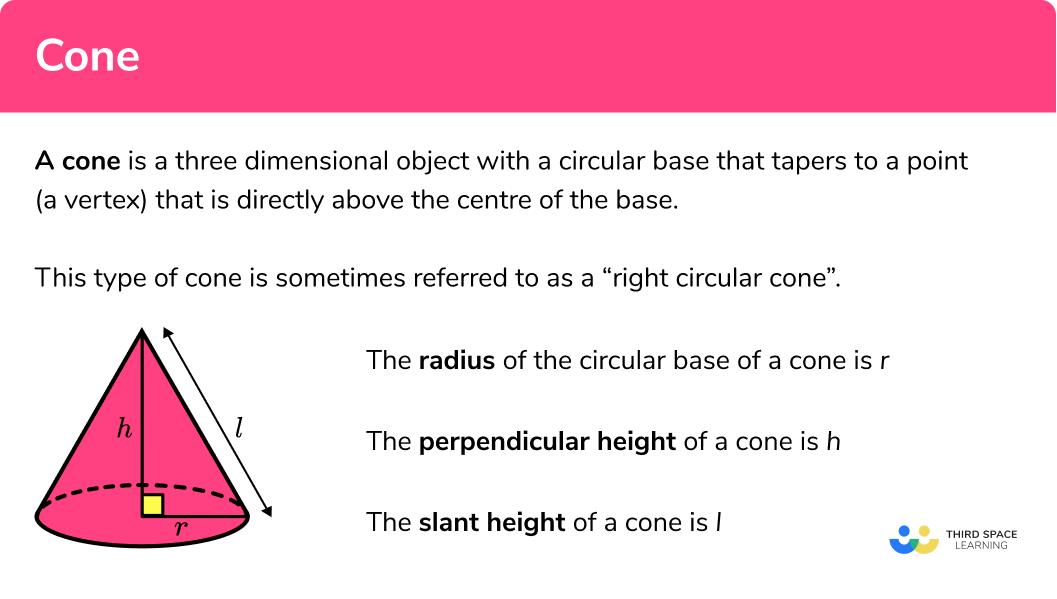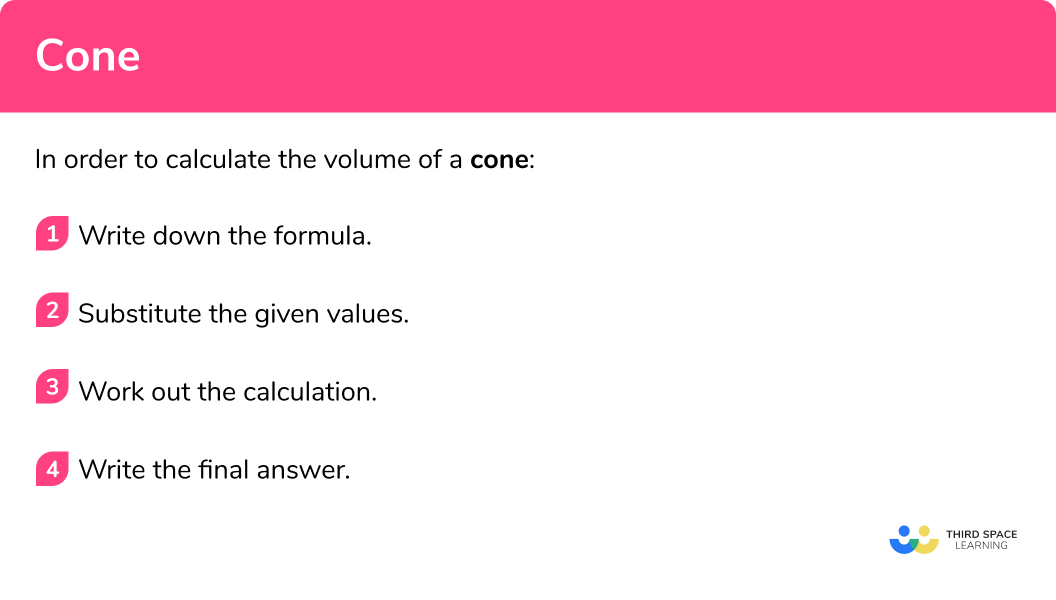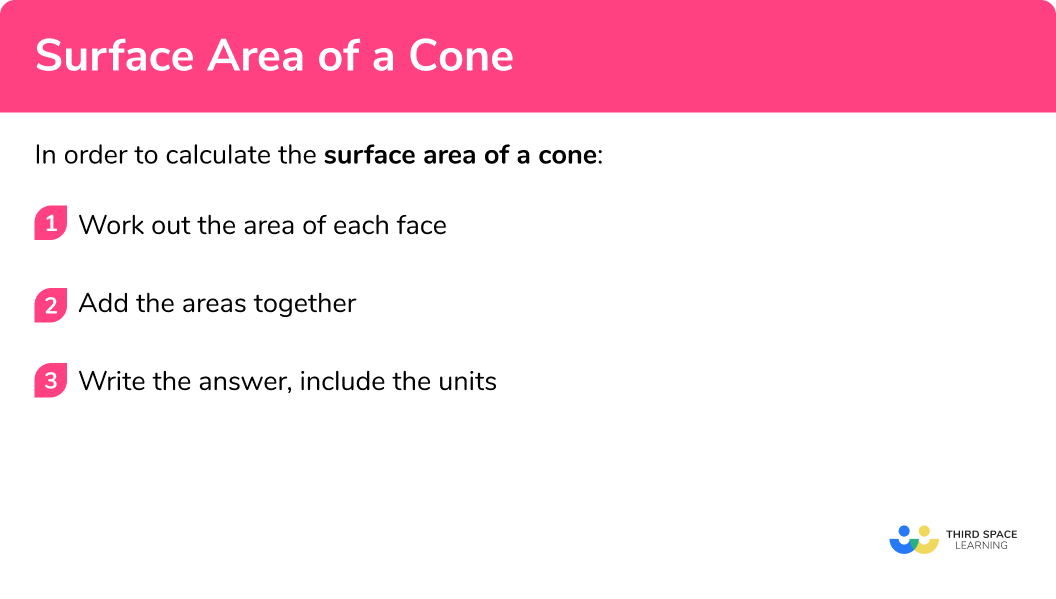GCSE Tutoring Programme
"Our chosen students improved 1.19 of a grade on average - 0.45 more than those who didn't have the tutoring."
In order to access this I need to be confident with:
Multiplying fractions Substitution How to work out perimeter Area RoundingThis topic is relevant for:

Cone
Here we will learn about cones, including how to find the volume of a cone and how to find the surface area of a cone.
There are also cone worksheets based on Edexcel, AQA and OCR exam questions, along with further guidance on where to go next if you’re still stuck.
What is a cone?
A cone is a three dimensional object with a circular base that tapers to a point that is directly above the centre of the base. This point is called the vertex or apex of the cone.
Cone shapes that you are used to in real-life would be ice cream cones or traffic cones. This type of cone is sometimes referred to as a “right circular cone” or “right cone”. There are also oblique cones where the apex is not directly above the centre of the base, and also cones that have an ellipse as a base rather than a circle.
Here are the important properties of a cone that you will need for GCSE Mathematics.
The radius of the base of the cone is r
The perpendicular height of the cone is h , this is the height at a right angle to the base.
The slant height of the cone is l
Cones feature in A level Further Maths in a topic called Conic Sections. This topic explores the links between cones and other shapes depending on the angle that a cone is sliced.
What is a cone?

Volume of a cone
The volume of a cone is how much space there is inside a cone. The volume of a cone is one third of the volume of a cylinder with the same height and radius.
The formula for the volume of a cone is:
\text{Volume}=\frac{1}{3} \pi r^2 hE.g. Find the volume of the cone
You also need to find the volume of a frustum. A frustum is the part of a cone left when the top part has been cut off.
Step-by-step guide: Volume of a cone
How to calculate the volume of a cone
In order to calculate the volume of a cone:
- Write down the formula.
- Substitute the given values.
- Work out the calculation.
- Write the final answer, including the units.
How to calculate the volume of a cone

Cone worksheet
Get your free cone worksheet of 20+ questions and answers. Includes reasoning and applied questions.
COMING SOONCone worksheet
Get your free cone worksheet of 20+ questions and answers. Includes reasoning and applied questions.
COMING SOONVolume of a cone examples
Example 1: volume of a cone
Find the volume of the cone with radius 5.3 \ cm and perpendicular height 7.8 \ cm .
Give your answer to 3 significant figures.
- Write down the formula.
2Substitute the given values.
\begin{aligned} \text { Volume } &=\frac{1}{3} \pi r^{2} h \\\\ &=\frac{1}{3} \times \pi \times 5.3^{2} \times 7.8 \end{aligned}3Work out the calculation.
\begin{aligned} &=\frac{1}{3} \times \pi \times 5.3^{2} \times 7.8 \\\\ &=229.443 \ldots \end{aligned}4Write the final answer, including the units.
=229 \ cm^3 \ (to \ 3.s.f)Example 2: volume of a cone
Find the volume of the cone with radius 9 \ cm and perpendicular height 11 \ cm .
Leave your answer in terms of \pi .
Write down the formula.
Substitute the given values.
Work out the calculation.
Write the final answer, including the units.
The question asks for the answer in terms of \pi so the final answer is 297\pi \ cm^3
Surface area of a cone
The surface area of a cone is the area which covers the outer surface of a cone.
The surface area is made up of two parts, a curved surface area and a circular base.
The formula for calculating the curved surface area of a cone is:
\text{Curved surface area}=\pi rlThe formula for calculating the area of a circle:
\text{Area of circle}=\pi r^2For the total surface area, we can add the two parts together:
\text{total surface area}=\pi rl+\pi r^2E.g.
Step-by-step guide: Surface area of a cone
How to calculate the surface area of a cone
In order to calculate the surface area of a cone:
- Work out the area of each face.
- Add the areas together.
- Include units.
How to calculate the surface area of a cone

Surface area of a cone examples
Example 3: total surface area of a cone
Find the curved surface area of the cone with radius 4.3 \ cm and slant height 9.6 \ cm.
Give your answer to 3 significant figures.
Work out the area of each face
\begin{aligned}
\text{Area of circle }&=\pi r^2\\\\
&=\pi \times 4.3^2\\\\
&=58.0880…
\end{aligned}
Add the areas together.
Total surface area: 129.6849+58.0880=187.7729...
Include units.
Surface area =188cm^2 \ (3sf)
Example 4: total surface area of a cone
Find the curved surface area of the cone with radius 8 \ cm and slant height 13 \ cm.
Leave your answer in terms of \pi .
Work out the area of each face
\begin{aligned}
\text{Area of circle }&=\pi r^2\\\\
&=\pi \times 8^2\\\\
&=64\pi
\end{aligned}
Add the areas together.
Total surface area: 104\pi +64\pi = 168\pi
Include units.
Common misconceptions
- Using the correct formula
There are several formulas that can be used, so we need to match the correct formula to the correct context
- Rounding
It is important to not round the answer until the end of the calculation. This will mean your final answer is accurate.
- Using the radius or the diameter
It is a common error to mix up radius and diameter. Remember the radius is half of the diameter and the diameter is double the radius.
- Make sure you have the correct units
For area we use square units such as cm^2.
For volume we use cube units such as cm^3.
Practice cones questions
1. Find the volume of a cone of radius 9.4 \ cm and perpendicular height 8.7 \ cm
Give your answer to 3 significant figures.




We are finding the volume of a cone so we substitute the value of r and h into the formula.
\begin{aligned} V&=\frac{1}{3} \pi r^2 h\\\\ V&=\frac{1}{3}\times \pi \times 9.4^2 \times 8.7\\\\ V&=805.014…\\\\ V&=805 \ cm^3 \ \text{(to 3 sf)} \end{aligned}
2. Find the volume of a cone of radius 8 \ cm and perpendicular height 6 \ cm
Leave your answer in terms of \pi .




We are finding the volume of a cone so we substitute the value of r and h into the formula.
\begin{aligned} V&=\frac{1}{3} \pi r^2 h\\\\ V&=\frac{1}{3}\times \pi \times 8^2 \times 6\\\\ V&=128\pi\\\\ V&=128\pi \ cm^3 \end{aligned}
3. Find the curved surface area of a cone of radius 4.3 \ cm and slant height 6.2 \ cm.
Give your answer to 1 decimal place.




We are finding the curved surface area of a cone so we substitute the value of r and l into the formula.
\begin{aligned} \text{Curved surface area}&=\pi rl\\\\ &=\pi \times 4.3\times 6.2\\\\ &=83.754…\\\\ &=83.8 \ cm^2 \ \text{(to 1 dp)} \end{aligned}
4. Find the curved surface area of a cone of radius 7 \ cm and slant height 9 \ cm.
Leave your answer in terms of \pi .




We are finding the curved surface area of a cone so we substitute the value of r and l into the formula.
\begin{aligned} \text{Curved surface area}&=\pi rl\\\\ &=\pi \times 7\times 9\\\\ &=63\pi\\\\ &=63\pi \ cm^2 \end{aligned}
5. Find the total surface area of a cone of radius 5.9 \ cm and slant height 8.5 \ cm.
Give your answer to 3 significant figures.




We are finding the total surface area of a cone so we find the curved surface area and add on the area of the circular base.
\begin{aligned} \text{TOTAL surface area}&=\pi rl+\pi r^2\\\\ &=\pi \times 5.9\times 8.5 + \pi \times 5.9^2\\\\ &=157.5508… + 109.3588…\\\\ &=266.90…\\\\ &=267 \ cm^2 \ \text{(to 3 sf)} \end{aligned}
6. Find the total surface area of a cone of radius 7 \ cm and slant height 10 \ cm.
Leave your answer in terms of \pi.




Make sure you find the curved surface area and the area of the circular base
\begin{aligned} \text{total surface area}&=\pi rl+\pi r^2\\\\ &=\pi \times 7\times 10 + \pi \times 7^2\\\\ &=70\pi + 49\pi\\\\ &=119\pi\\\\ &=119\pi \ cm^2 \end{aligned}
Cone GCSE questions
1. Here is a cone with radius 7.3 \ cm and perpendicular height 9.5 \ cm.
Find the volume of the cone.
Give your answer to 3 significant figures.
(2 marks)
(1)
530.148…=530(1)
2. Here is a cone.
Find the total surface area of the cone.
Give your answer to 3 significant figures.
(3 marks)
(1)
835.663…+\pi \times 14^2(1)
1451.4…=1450(1)
3. A container is a cone of radius 60 \ cm and perpendicular height 80 \ cm.
Water fills the container at a rate of 9000 \ cm^3 per minute.
How long does it take to fill the container?
Give your answer to the nearest minute.
(3 marks)
(1)
301 592.89… \div 3000=33.51…(1)
33.51…= 34 \ \text{minutes}(1)
4. Here is a cone.
Find the volume of the cone..
Give your answer to 3 significant figures.
(3 marks)
(1)
V=\frac{1}{3} \times \pi \times 4^2 \times 9.1651…(1)
153.563…=154(1)
5. A cone has a radius of 11 \ cm.
It has a volume of 2000 \ cm^3.
Find the total surface area of the cone.
Give your answer to 3 significant figures.
(5 marks)
(1)
l=\sqrt{11^2 + 15.783…^2}=19.2388…(1)
CSA= \pi \times 11\times 19.2388…=664.847…(1)
664.847…+\pi \times 11^2(1)
1044.97…=1040(1)
Learning checklist
You have now learned how to:
- Calculate the volume of a cone
- Calculate the curved surface area of a cone
- Calculate the total surface area of a cone
The next lessons are
Still stuck?
Prepare your KS4 students for maths GCSEs success with Third Space Learning. Weekly online one to one GCSE maths revision lessons delivered by expert maths tutors.

Find out more about our GCSE maths tuition programme.